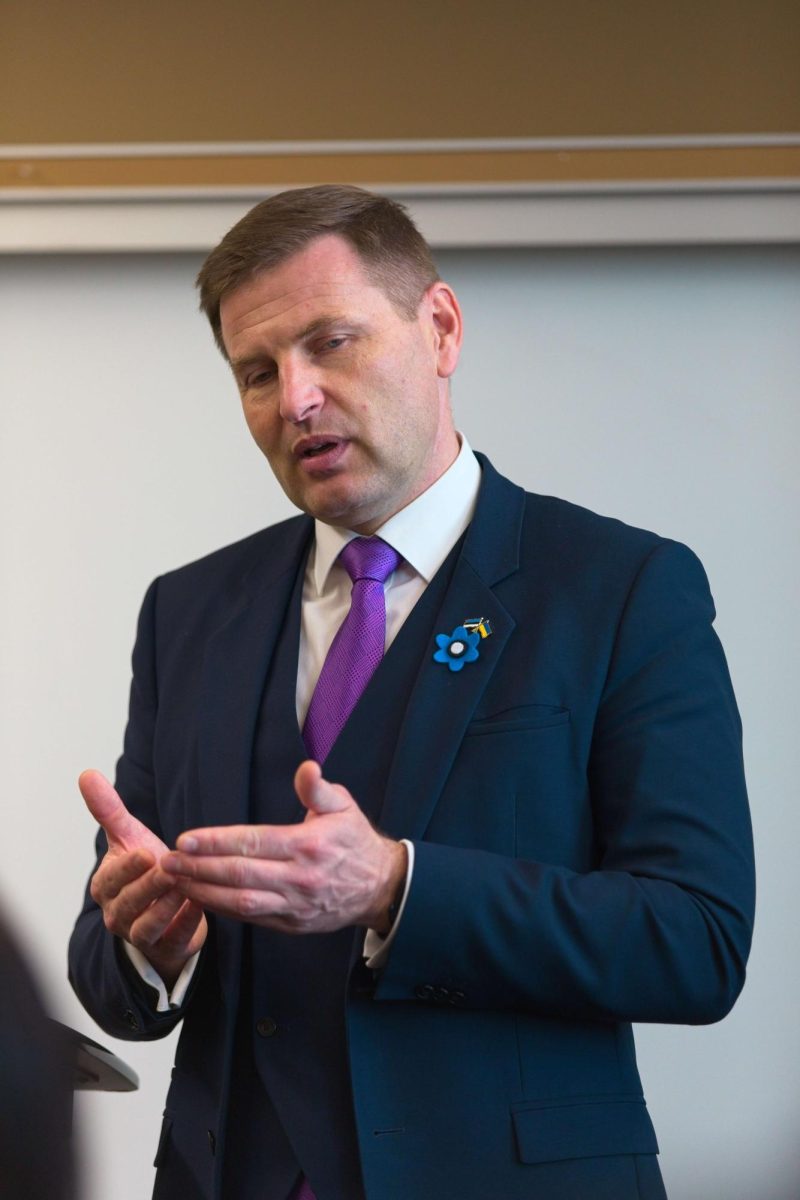Hanno Pevkur, the Estonian minister of defense, visited Augustana on April 9 where he spoke to Xiaowen Zhang’s political science class in Old Main regarding foreign relations. Zhang’s class was joined by about 30 other members of the Augustana community.
Estonia faced Russian aggression throughout the 20th century, which is why, according to Pevkur, Estonia supports Ukraine today and encourages others to do so too. Pevkur connected this to conflicts around the world, such as the war between Israel and Hamas.
“[Russia’s] aim is very simple,” Pevkur said. “They aim to destabilize societies and then take control.”
According to Pevkur, Estonia faces cyber attacks from Russia nearly every day. He also highlighted the relative lack of growth in Estonia compared to Finland, which was never fully a part of the Soviet Union.
“In 1938, we had more or less the same GDP per capita,” Pevkur said. “In 1991 we were behind Finland by [a factor of 17].”
Estonia ranks highly in a 2020 UNICEF report on matters such as education, health and societal structure but continues to be affected by its past. In 1941 and 1949, many Estonians were deported to harsh regions of Russia in an effort to spread out and weaken their culture.
“Tens of thousands of people were deported,” Pevkur said. “Mostly women and children because the men were dead [following the war], and mostly those who were somehow linked to either leading the country or leading the economy.”
This deportation, according to Pevkur, made it easy to repress Estonians.
“You take away the best part of society,” Pevkur said.
Not only were Estonians deported to Russia, but others were also deported to Estonia. Pevkur said that although the Russians attempted to repress their culture, their culture ultimately survived.
“Estonians have been quite lucky,” Pevkur said. “The Soviets did a lot to take our language away from us, but our leaders at that time were smart enough to keep it alive.”
The Estonian Song and Dance Festival, according to Pevkur, is one such example. Now an event that draws over 100,000 people, the festival almost didn’t survive Soviet occupation, which lasted until 1991.
Some Russians justify the war in Ukraine as a way of protecting Russians who live there from cultural erasure, but this dark chapter of Estonia’s history is just one example of cultural erasure at the hands of Russians.
This, Pevkur explained, is why the war against Ukraine is also a war on our values, such as freedom of speech.
Senior Naya Allen, a political science major, was in the room and asked a question about how the coming United States presidential election might impact Europe.
“I wanted to see what an outsider’s opinion of the US election would be,” Allen said. “Both administrations have faced criticism for their foreign policy, and… right now all eyes are away from Ukraine as we’re focused on Israel and Gaza.”
Pevkur’s response, according to Allen, was that some people will always be unhappy with a politician’s actions. Whatever happens in November, he hopes that the president will continue to stand for Ukraine and its values.
Allen was excited to meet a high-ranking official from a foreign country. Her own senior inquiry (SI) project is related to Europe.
“I was geeking out because this is what I want to go into: diplomacy,” Allen said.
According to the Iowa Capital Dispatch, the Midwest even has ties to Estonia. Lewis Machine & Tool, for example, is located in Eldridge, Iowa and supplies weapons to the country.
Though the political atmosphere in the United States has only become more intense, Allen feels it’s important to look beyond the most prevalent narratives.
“It seems like the more powerful position right now is actually Congress,” Allen said.
Accordingly, it’s just as important, Allen said, to be invested in the elections for Congress as it is to be invested in the election for president.









































































































